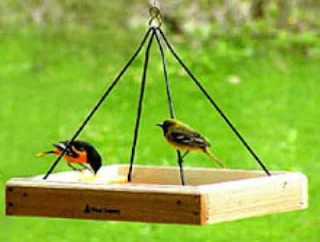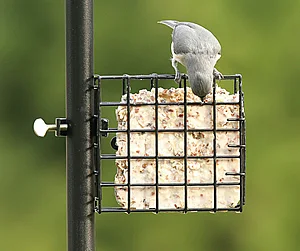A
bird feeders , bird table, or tray feeder are devices placed outdoors to feed birds .
The success of a bird feeder in attracting birds depends on its placement and the kinds of foods in the feeders as different species of birds have different preferences.
Types of feeders
1- Seed feeders : Seed feeders are the most common type. These can vary in design from tubes to hoppers and trays. Sunflower seed or mixed seed are popular for use in these feeders and will attract many songbirds such as cardinals, finches, and chickadees. Black Oil Sunflower seed is especially popular with bird enthusiasts
Seed feeders are mainly squirrel proof, tube-like or hopper. Due to the need of keeping squirrels away from the bird food .
seed feeders types
1- Tray or platform feeder : A platform feeder is any flat surface,. it should have plenty of drainage holes to prevent water accumulation. A platform should be with a roof to help keep seeds dry. Trays attract most species of feeder birds. Placed near the ground, they attract juncos, doves, and sparrows.
here some pictures of seed platform bird feeders
simple shapes of
seed platform bird feeders
 |
| seed platform bird feeders |
 |
| seed platform bird feeders |
 |
| seed platform bird feeders |
|
| seed platform bird feeders |
 |
| seed platform bird feeders |
A hopper feeder is a platform with walls and a roof , so it can protect seed against the weather. Hoppers attract most species of feeder birds. Most hoppers hold a good quantity of seed.
Here is some pictures of hopper feeders
 |
| House hopper bird feeder |
 |
| House hopper bird feeder |
 |
| House hopper bird feeder |
3-
Tube feeder :
A
tube feeder is a hollow cylinder, often made of plastic, with multiple feeding ports and perches. Tube feeders keep seed fairly dry. Feeders with short perches accommodate small birds such as finches but exclude larger birds such as grackles and jays. The size of the feeding ports varies as well, depending on the type of seed to be offered.
 |
| Tube feeder |
 |
| Nyjer feeder |
Nyjer feeders are special tube feeders designed with extra-small openings to dispense tiny nyjer seeds, also known as thistle seed. These feeders attract a variety of finches.
 |
| nyjer bird feeders |
it is not seed feeders
Suet or suet mixes can be placed in an onion bag or a specially made cage. Suet also can be tied to trees or smeared into knotholes.you can Place in it
a piece of cake or fat animals not seed, to feed certain categories of birds include: woodpeckers, nuthatches, and chickadees
Cages that are only open at the bottom tend to be starling-resistent but allow woodpeckers, nuthatches, and chickadees to feed by clinging upside down.
Here is some pictures of suet feeders
 |
| suet feeder |
 |
| suet feeder |
 |
| suet feeder |
 |
| bottom suet feeder |
3- Nectar feeder
Nectar feeders are specially made to dispense nectar through small holes.
you must change nectar every three to five days to prevent mold and deadly fermentation. NEVER use honey or artificial sweeteners. Honey readily grows mold that can be harmful to hummingbirds .
to make nectar for hummingbirds, add one part sugar to four parts boiling water and stir. A slightly more diluted mixture can be used for orioles (one part sugar to six parts water). Allow the mixture to cool before filling the feeder.
 |
| nectar bird feeder |
you can buy bird feeders online at



















Post a Comment
0Comments